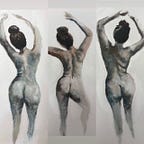Today I realized that I don’t really want to be alive. That’s pretty common. Rather than being anomalous amongst my generation(millennials) and peers, it’s a staple of our resiliently fragile lives in a rapidly eroding planet and social economy. Our lack of a will to live is an ever-evolving Twitter joke, often delineated further by the resignation of lower-case letters and punctuation. We stop laughing for a little while on the heels of actual suicides, because we don’t really think death is funny. I don’t want to be alive, but thanks(I guess) to my over-exaggerated sense of self-importance, I also don’t want to be dead.
There’s a concept referred to as Object A, or the Sacred Object; it is the thing that promises to bring a person the experience they most want: happiness, peace, security, admiration, etc. It is the thing on which a person relies for our best and fulfilled life. For some, this is embodied in the hope for a romantic partner, a child, a professional accomplishment. It could be the dream of owning property, a place to build a home. For others, the form that this holy hope takes is that of their faith or spiritual belief. If all else fails to deliver relief from the pain of existence, there is the distant-close hope that the Divine will deliver. Object A represents hope for the future.
In most forms of western Christianity, the hope is for the next life. This life is expected to produce strife, while the next will beget a heavenly lack of suffering or sin. According to Zen Buddhism, it is the surrendering of attachments that frees one from suffering. Followers of Siddhartha(later Buddha) adhere to the second noble truth: that the basic cause of suffering is “the attachment to the desire to have (craving) and the desire not to have (aversion)”. It seems that, for Buddhists, Object A is the loss of itself.
For a handful of generations, leading up to and including the baby boomers, for many US citizens Object A took the flag-enshrouded form of the American Dream. The promise of a career, home and family for every man - lets assume white and heteronormative* - that was willing to work hard, and the promise of love and lineage for the women -* - who supported them. The mid-life crisis of the middle-class (wo)man is marked by an emotional transition resulting from the taking stock of one’s life in later years. What used to mean everything(spouse, career, family, church) has failed to deliver on it’s promise of everlasting fulfillment, and an internal unraveling ensues. The amount of societal denial, ignorance and bias required to believe that dream was ever accessible to everyone could fill proverbial storehouses, but the dream it was.
I(like most of my generation) don’t have those kinds of hopes. I’m not currently up to the task of describing why and how the radicalization of competition, combined with the endless source of information and audience to be found on internet, sacrificed our collective morality on the alter of individual advancement, but it did, and it changed us(I recommend Jia Tolentino’s essay, The I in Internet). It didn’t take middle age for us to realize that a house and family won’t make us happy, even if we could afford and qualify for the education that would grant us a career path that would make that an actualizable end.
I’ve known people, and longed to be among them, that find an unshakeable hope in believing that there is a Greater Good. Scientists have proven that the brains of those who believe in a loving God are tangibly different than those who don’t, and they are more capable of retaining a sense of hope and optimism for the future, believing good things are coming. This isn’t proof that it’s true, but it sure does sound nice.
Here’s how it finally happened, the loss of my will to live: I imagined the realization of my attainable goals, the actualization of the things I value and believe in, and I knew with absolute certainty that none of them would make me stop feeling sad or existentially afraid. Despite an understandable amount of existential dread as a result of living in a patriarchal self-appointed hegemony in late capitalism, I’ve retained my tenuous grip on optimism up to this point. In a rare and oft avoided moment, I gave the familiar knot of unidentifiable pain in my chest my full attention, and asked myself the dreaded question:
Will it always be like this?
Hope relies on the belief that good things are coming. For myself that means that, big or small, we’re collectively taking steps toward a world with greater freedom, equality, peace, and love.
Here’s the problem.
Our fellow citizens willingly elected an open bigot, systemic institutions of oppression are continuing to subjugate the most vulnerable among us, our parents make fun of us for going to therapy, and the end of the world is barreling toward us at unprecedented speed. If good things are coming, I can’t see them.
Object A is dead, and no one is coming to save us.
It’s depressing, I know.
I do wonder if we have an opportunity to find a new kind of hope, one that doesn’t rely on a promised return on our investment. I suppose this is why many choose faith, or “the belief in that which is unseen.”
Historically, true revolutionaries don’t rely on the guarantee of a positive outcome to maintain their absolute commitment to goodness. They understand that the change they are fighting for and loving for may not come in their lifetime. This is the kind of hope I want, but I haven’t found it yet.
